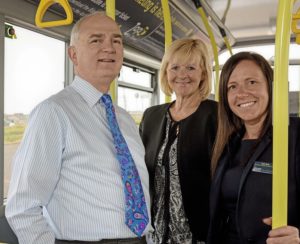Vision, ambition and leadership delivers
Five years ago, Blackpool Transport Services stirred the industry with its plan to upgrade the whole operation. Under MD Jane Cole’s inspirational leadership, delivery of the programme to upgrade the bus fleet will be completed in the coming weeks so David Cole recently visited the company to learn of its benefits.
Blackpool is a town that is re-inventing itself, looking for new opportunities to grow employment and amenity opportunities for its visitors and resident population.
At around 139,000, the latter has been in decline for a number of years and faces the added challenges of ageing and deprivation but the town’s unitary authority is delivering on investment and among other successes, unemployment has halved over the past five years. Transport is a crucial part of the process and as sole shareholder in Blackpool Transport Services (BTS), Blackpool Borough Council has been receptive to the vision promoted by Managing Director Jane Cole, not just in asset investment but across the wider scope of inclusivity and accessibility.
Background
BTS operates commercial bus services across Blackpool and into the neighbouring districts of Wyre and Fylde with a PVR of around 100 vehicles.
 The compact nature of Blackpool Borough means there are no statutory school travel requirements in the town although BTS provide some additional peak time commercial journeys. There are no bus services contracted by the authority and limited commercial competition, primarily Stagecoach’s frequent inter-urban to Preston and a seafront service by Catch 22.
The compact nature of Blackpool Borough means there are no statutory school travel requirements in the town although BTS provide some additional peak time commercial journeys. There are no bus services contracted by the authority and limited commercial competition, primarily Stagecoach’s frequent inter-urban to Preston and a seafront service by Catch 22.
BTS also operates under contract the tramway along the Fylde Coast using 18 Bombardier Flexity 2 lowfloor trams for the year-round service and up to 20 out of the town’s 40 heritage vehicles on the seasonal and weekend Heritage Tram Tours operation.
At its summer peak, BTS has a staffing level around 650 together with a number of volunteers on the heritage operation. The company operates from three locations, the tram depot at Starr Gate, town centre offices in Market Street and the headquarters with bus and tram depots at Rigby Road. A turnover of £25m was posted for the 2018-9 financial year with the company returning around £1m annually in dividends and tramway licences to its shareholder for investment in the town.
Leadership and people are key
“Doing the same old job in the same old way with new assets would mean we have failed” is how Finance and Commercial Director, James Carney, sees the critical importance of changing the way the business works, particularly in the involvement of stakeholders, customers and staff at all levels. He is quick to acknowledge the inspirational leadership that Jane Cole has brought to the business with her background in modern management methods at Virgin Trains. Jane has also played a key role in reaching out to disabled stakeholders, complimenting engagement with staff and the local authority by Director of People and Stakeholders, Sally Shaw.
Staff initiatives are designed to encourage a relationship based on trust and make BTS an employer of choice. The success of this has seen staff turnover reduce to 12% from 20% against a background of declining unemployment in the town. A recent two-year pay deal is part of the plan to retain staff and fits the company’s concept of: “A strategic fit for every initiative.” Another small step that has been positively received by staff is the extension of sick pay to the first day of self-certified sickness. In return staff are expected to attend 15 minutes early on their return for a back to work review, thereby saving potentially a lost half shift while this activity takes place.
Training has been re-energised under Sally Shaw’s leadership as a key aspect of building the success of the business, involving both existing staff and the introduction of new staff through apprenticeships. 42 of the latter across a wide range of disciplines have been engaged during the past five years. With the current focus on mental health, BTS has signed up to the ‘Time to Change Pledge’ (from Lancashire MIND), training 80 volunteer wellbeing ambassadors across the business to ‘Be The Shoulder’ (BTS) and confidentially support colleagues.
The bus fleet
In the first decade of the 21st century, Blackpool Borough Council invested heavily in the modernisation of the tramway, completed in 2012. This primarily benefitted non-residents of Blackpool who make up around 80% of its annual patronage. Investment in the BTS bus operation with 80% annual patronage by residents failed to keep pace and by the time Jane Cole and her new executive team took over, the fleet was ageing. The majority were becoming life-expired and their cost of operation was expected to rise significantly.
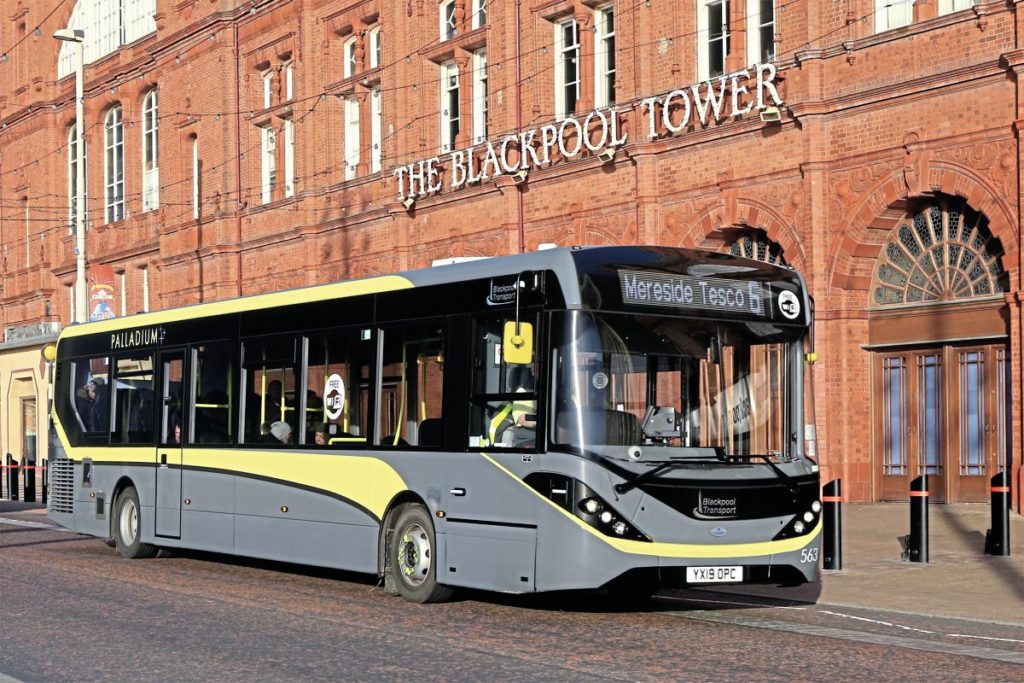
2019’s new ADL vehicles were mainly the longer variant of the Enviro 200 MMC. All Palladium brand vehicles carry a silver heart on the side referencing their year of introduction to service
Knowledgeable of attractive finance packages available to local authorities, James led the development of a proposal to replace the fleet on a rolling five-year basis. Under Jane’s leadership, the plan was positively received by stakeholders and BTS secured a loan scheme from its shareholder which will have resulted in a £21m investment when 2020’s deliveries arrive in the spring. BTS own the vehicles, paying back the loan with interest over a ten-year period. For valuation purposes, a straight line 12-year depreciation profile is allocated to the vehicles, which gives a similar figure to the ten-year mortgage profile when the vehicles are sold after five years.
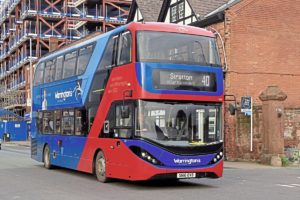
In a mutually beneficial deal, BTS have sold the first two Enviro400 City vehicles delivered under the arrangement with ADL to Warrington’s Own Buses, another business owned by the local authority
In a transaction beneficial to both parties and although not yet five years old, two of the ADL Enviro400 City vehicles were recently identified as being able to be released to Warrington’s Own Buses who were urgently in need of high-specification double-deckers. This was facilitated by BTS’s forward plan that sees a greater role for single-deck vehicles after significant investment in double-deckers at the
start of the commercial arrangement with ADL. Initiated in 2016, this has provided vehicles optimised for BTS’s requirements including five-year warranties and a five-year parts agreement. James says the ADL arrangement has worked very well for BTS and praises the attentiveness of the ADL team. What issues that do arise are often spotted first by the ADL Connect system which will advise BTS of the course of action to take. If necessary, ADL staff will be on site within 24 hours and they also provide a 24-hour turnaround on parts needed from their Skelmersdale facility.
From Spring 2020, the BTS fleet will consist of 105 ADL vehicles under five years old (58 Enviro 400 City double-deckers and 47 Enviro 200 MMC single-deckers in two lengths) together with the ten Mercedes-Benz Citaros that introduced the Palladium branding and standard back in 2015 and are due for replacement in 2021. These 115 Euro VI vehicles cover the PVR requirement with a spare vehicle provision reduced from 23% to 17% based on improved reliability from a younger fleet. The eight Euro V Plaxton Centro bodied Volvo B7RLEs refurbished in 2015 are also being retained as a rail replacement fleet but may be used on normal duties to release higher capacity vehicles to cover tramway and network rail outages.
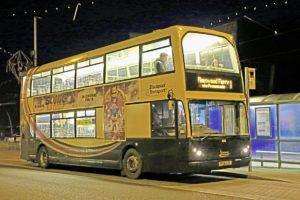
New vehicles in 2020 will replace the remaining Tridents that carry pre-Palladium liveries. In the twilight of its Blackpool career, this one provides some illumination on a dark February Promenade evening
The new ADL vehicles to complete the Palladium fleet in 2020 will replace the last of the East Lancs bodied Tridents that have formed the core double-deck fleet for many years. In doing so, the last vestige of earlier branding will disappear from the operational fleet.
During the five-year investment programme, the vehicle specification has not stood still so the latest deliveries benefit from new features such as two wheelchair spaces, a forward-facing display screen visible from the wheelchair spaces and mobile phone holders integrated into the back of the Lazzerini seats. A high standard of presentation is core to BTS image with each vehicle being washed and mopped out daily. Together with the Palladium branding, this makes the vehicles stand out, not just to residents and visitors to the Fylde coast but further afield where they appear on rail replacement activities. In doing so, they project the positive image of Blackpool that their shareholder is driving forward.
Operational benefits
The business case to justify the additional investment in new vehicles included a variety of operational cost savings and these are being achieved. Fuel economy has seen a 17% improvement, driven significantly by the Smart Pack included in the ADL specification; the value of vehicle-related invoices processed monthly has halved; £70,000 of stock has been removed from BTS’s balance sheet through the ADL five-year parts agreement ,and the rolling average mileage between breakdowns has increased from just over 5,000 to over 12,000.
More savings have come from a nett reduction of ten (nearly 20%) in the bus engineering establishment, achieved through natural turnover and retirement of a mature existing workforce and balanced by new blood introduced through BTS’ apprenticeship scheme.
The employer of choice work with staff has contributed significantly to improvements in driver behaviour, leading to reductions in both complaints and accidents. Vandalism has also been reduced, the company working with schools to develop respect for the company’s property after an initial spate of damage to the upper-deck tables of the first Palladium double-deckers. CCTV records are shared with head teachers should a specific issue arise. The work with schools also focuses on developing young people as lifelong customers of the business and advising of potential career opportunities.
Serving the customer
The image of a modern, well-presented fleet driven by engaged staff is a crucial element in turning around years of declining passenger numbers and growing BTS’ customer base. James was pleased to report that the strategy is beginning to deliver with January 2020 being the first month to show an increased, year-on-year in patronage on a like-for-like basis.
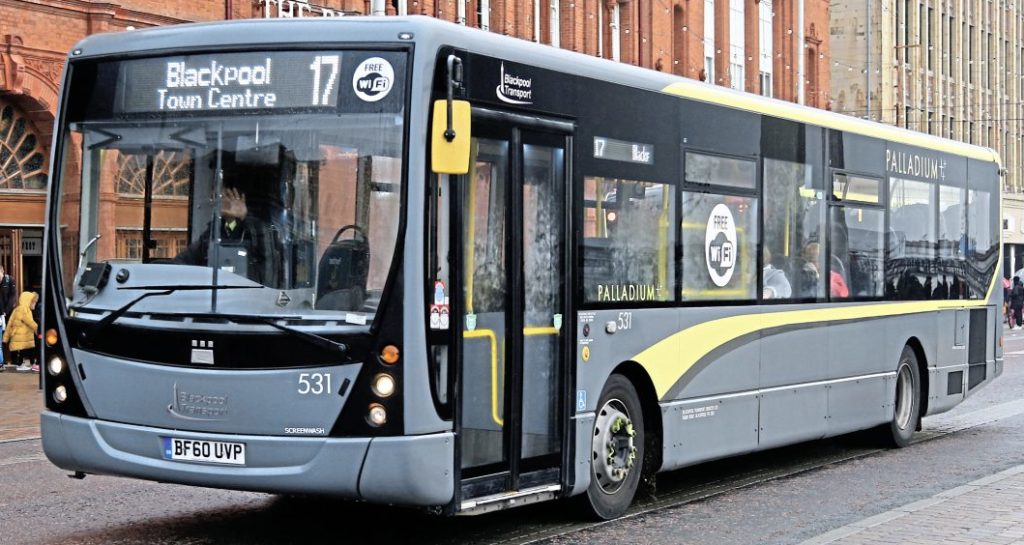
Rail replacement is a significant activity for BTS. Double-deckers are often used; covering for the tramway while trackwork takes place in Fleetwood when we visited. From 2020 the refurbished Volvo B7RLE vehicles like this one, currently in all-day service, will be retained as a nominally dedicated fleet for this activity
The fleet replacement plan initially envisaged a slightly larger fleet, however an overdue review of the network has resulted in the recent withdrawal of two loss-making circular services. The network had been maintained stable for an extended three-year period to avoid additional disruption to customers beyond that caused by diversions as a result of town centre ‘regeneration’ (including an extension to the tramway to a new transport hub at the railway station, now expected in 2021).
Seasonality is a key issue for the business; a good summer month can deliver a profit twice numerically the level of loss associated with a winter month. There are also Blackpool-specific challenges; traffic congestion on illumination weekends regularly caused serious disruption to the bus services using the Promenade. A potentially brave decision was taken to split these services at either end of the town centre. Despite the need for through passengers to take a short walk or an inland shuttle between the termini, the measure has been positively received for the reliability it has given to the main part of the routes.
Future
Completing the first vehicle replacement cycle is just one of the steps that BTS is taking on the journey to support the re-invention of Blackpool. The company is looking seriously at electrification when the next vehicles are replaced at five years old in 2021 although this could depend on zero-emission funding opportunities. Ironically, perhaps having a fleet of modern low-emission vehicles and electric trams may have contributed to the company not being successful in securing a share of the most recent fund allocation. Despite these modern vehicles, and the regular stiff breeze from the Irish Sea, densely populated Blackpool retains a particulate issue with related deaths significantly above the Lancashire average. One area where electric vehicles will be less of a challenge for the company is in the workshops where there is opportunity to harness the high-voltage skills in the existing tramway workshop staff.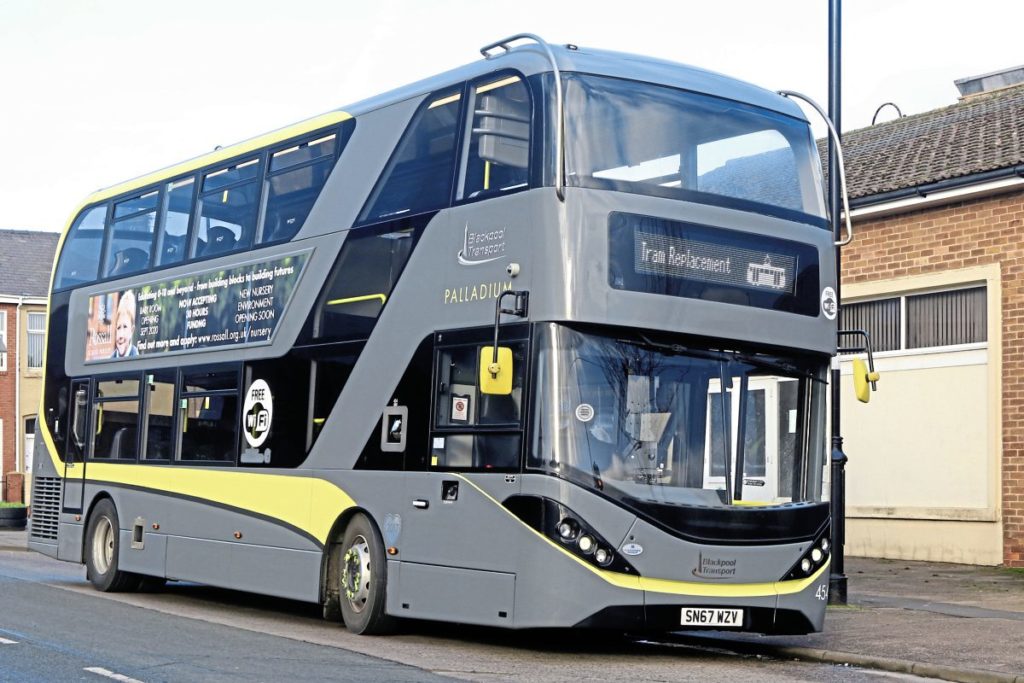 Redevelopment of the bus depot premises is also planned in the short term, giving a more compact modern facility that is commensurate with running a modern, low-maintenance fleet and designed from the outset to accommodate a future electric bus fleet.
Redevelopment of the bus depot premises is also planned in the short term, giving a more compact modern facility that is commensurate with running a modern, low-maintenance fleet and designed from the outset to accommodate a future electric bus fleet.
Alongside this asset strategy, BTS will continue to target growth and inclusion, taking the bus to market segments where it is not the mode of choice. The fast-growing Blackpool Transport App is a key tool in future engagement and James suggested one example would be the significant retired population attracted to Blackpool and the surrounding districts. Many of these will have been wedded to the car for their whole lives, so engaging with them and de-mystifying bus travel could bring benefits to both parties. Park and Ride is also under investigation.
ALBUM 2020
Vision, ambition and leadership are at the core of BTS success and the company will be promoting these values when Blackpool hosts the 2020 ALBUM Conference. This will take place at the Village Hotel in Blackpool on 5-6 May 2020.
Further information can be found at https://bit.ly/3bs7BRO
